|
|
|
Sort Order |
|
|
|
Items / Page
|
|
|
|
|
|
|
| Srl | Item |
| 1 |
ID:
131029
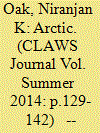

|
|
|
|
|
| Publication |
2014.
|
| Summary/Abstract |
Regionalism as a political project has been a signi?cant phenomenon in post-1945 international relations. The third phase of regional integration began towards the end of the 19805 within the international context created by the end of the Cold War. Academics dubbed it as "new regionalism".' Most of the regional organisations that came up in those days were based on economic cooperation among the states. It was an era of globalisation. The Arctic Council (AC) which emerged in 1996 was a unique case. The 'Arctic' has emerged as a region in international cooperation during the past 20-30 years, as manifest in the creation of the AC. The objective of the AC was sustainable development and environmental protection only, and that is why it may be termed as a unique case in that period.
|
|
|
|
|
|
|
|
|
|
|
|
|
|
|
|
| 2 |
ID:
131031
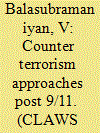

|
|
|
|
|
| Publication |
2014.
|
| Summary/Abstract |
Most studies on terrorism and political violence by experts and researchers have focussed on the causation factors of terrorism over the years. A majority of the scholarly works has mostly focussed on the historical, ideological, and etiological aspects of terrorism and insurgency. Scholars, researchers and investigators have attempted to epitomise and de?ne terrorism as a phenomenon, and have admitted to the problems in ?nding a universally acceptable de?nition. They have primarily focussed on bringing out an acceptable definition of terrorism in all its manifestations and forms, and in the process, have analysed the roots, origins and growth of terrorism. Compared to the enormous literature on the growth and incline of terrorism the world over, studies or scholarly works on the decline of terrorism or insurgency are not as vast and are limited in number.' A few experts like Martha Crenshaw and Audrey Cronin have dealt with this aspect in detail.' However, these attempts comprise only a fragment of the total terrorism literature in place.
|
|
|
|
|
|
|
|
|
|
|
|
|
|
|
|
| 3 |
ID:
131512
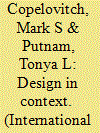

|
|
|
|
|
| Publication |
2014.
|
| Summary/Abstract |
This research note highlights an important element missing from rational design theories of international agreements: "institutional context"-the presence or absence of existing and prior agreements between prospective partners in "new" cooperation. If, as rational design theorists argue, agreement design is deliberate, strategic, and directed toward enhancing contracting parties' ability to credibly commit to future cooperation, then prior design "successes" should influence the terms of additional cooperation. We test for this omitted variable problem in three agreement design outcomes: ex ante limitations on agreement duration, exit clauses, and dispute-settlement provisions. Through an augmentation and reanalysis of data from a key study in the rational design literature-Barbara Koremenos's "Contracting Around International Uncertainty"-we show institutional context is positively correlated with inclusion of ex ante time limitations in negotiated agreements and negatively correlated with the inclusion of exit clauses and third-party dispute-settlement provisions. Institutional context also mediates and conditions the effects of the explanatory variable at the heart of existing rational design theories-uncertainty about the future distribution of gains from cooperation. Our findings show that the collective appeal of particular design features varies not only with the nature of underlying strategic problems, but also with degrees of shared institutional context.
|
|
|
|
|
|
|
|
|
|
|
|
|
|
|
|
| 4 |
ID:
184472
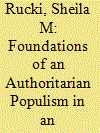

|
|
|
|
|
| Summary/Abstract |
The rise of populism, and its subsequent challenge to liberal democratic institutions, is an ongoing feature of twenty-first century global politics. The author contends that providing college students with theoretical tools to untangle the relationship between the logic and practices of domestic populist political movements and liberal democratic institutions empowers them to analyze critically those challenges and consider the extent to which populism is indicative of prior institutional failure. The work of Antonio Gramsci and Ernesto Laclau are used to develop a model of populism appropriate for advanced undergraduate international relations students. The cases of the Tea Party, Donald Trump’s 2016 presidential campaign, Victor Orbán’s rise in Hungary demonstrate the dynamics of the model and its relevance to the study of international relations and foreign policy.
|
|
|
|
|
|
|
|
|
|
|
|
|
|
|
|
| 5 |
ID:
127014


|
|
|
|
|
| Publication |
2013.
|
| Summary/Abstract |
Diplomats are grappling today with a host of problems in a globalized world: countries are becoming increasingly linked; national boundaries have grown more porous; and borders between internal and external processes are disappearing. The foreign affairs of any country do not stand by themselves anymore, diplomats can no longer be guided exclusively by large-scale geopolitical plans or constructs. The development of any one country and the logic of how its central government is built hinges on the surrounding situation in the same way that the global situation depends on the decisions taken by large - and not so large - countries. And, of course, foreign policy professionals cannot be indifferent to events happening within their countries and to whether these events befit the international context or stand at odds with it.
|
|
|
|
|
|
|
|
|
|
|
|
|
|
|
|
| 6 |
ID:
131030
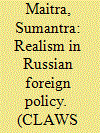

|
|
|
|
|
| Publication |
2014.
|
| Summary/Abstract |
The Crimean crisis marks a pivotal point in the rations between Russia and the West. The revolution in Ukraine, and the subsequent events that unfolded at breakneck pace, including the annexation of Crimea by Russia, throws up a lot of questions, the answers to which will have a massive impact on foreign policy and inter-state relations in the future. It also throws up some broad patterns. The crisis is a worrying return to a trend of land annexation by a great power on a pretext, a trend which was thought to be long dead Munich Conference of 2007. It brings back the debate on the concepts of "Perception and Resolve" in foreign policy. And, perhaps, most importantly, it serves as a vindication of realists over the liberals, constructivists and other paradigms of international relations, and validates the often discussed idea that state interests triumph over every other aspect.
|
|
|
|
|
|
|
|
|
|
|
|
|
|
|
|
| 7 |
ID:
085862
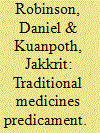

|
|
|
|
|
| Publication |
2008.
|
| Summary/Abstract |
The ongoing use and protection of traditional medicines presents unique challenges for authorities, practitioners and stakeholders. With changes in the international intellectual property environment and biodiversity regulation, the Thai government has responded to ensure that traditional medicines, texts, traditional medical formulas, medicinal plants and herbs are protected through the development of a sui generis law. Drafted in 1999, the Act on Protection and Promotion of Thai Traditional Medicinal Intelligence is now being implemented in stages. Recent incidents, including controversies surrounding local and foreign patents over a Thai medicinal herb named kwao krua (Pueraria mirifica), have given impetus to traditional medicines protection, but have also tested the utility and implementation of the act by the Thai Department of Public Health. This article discusses the issues and implications in Thailand, while also reflecting on the approaches for traditional medicines protection internationally and in other countries.
|
|
|
|
|
|
|
|
|
|
|
|
|
|
|
|
|
|
|
|
|